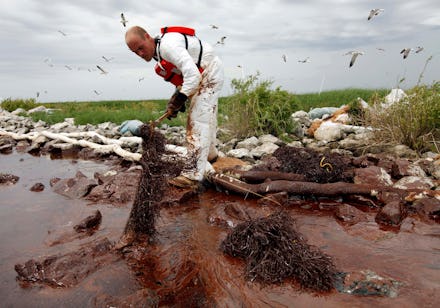BP Didn't Ruin the Gulf of Mexico, Says BP PR Chief

The news: What oil spill?
On Tuesday, Politico published a story written by a BP spokesman claiming that BP's massive 2010 oil spill didn't ruin the Gulf of Mexico. "No, BP Didn't Ruin the Gulf" is written by Geoff Morrell, the senior vice president of U.S. communications and external affairs for the oil giant, so there's a good chance it might be just slightly biased.
Morrell asserts that the "ongoing litigation and political wrangling" over the Deepwater Horizon disaster, which swamped the ocean floor with five million barrels of sweet crude oil and ruined aquatic life, has "generated considerable speculation" about how much money BP has to pay out and the amount of financial assistance that will go to Gulf Coast states.
He asks, "Lost in all that is a more fundamental question: What impact did the spill actually have on the Gulf Coast environment?" Right, forget about money for a second, even though that's all BP thinks about, as when the company asked a federal judge for a refund of several hundred million dollars from small businesses.
Anyway, Morrell points to news reports that lamented the oil spill's damaging effects, which, in his words, didn't materialize:
Last year, for example, recreational fishermen caught more pounds of fish than in nearly 30 years, according to data from the National Oceanic and Atmospheric Administration.The oil didn't make it to Tampa — let alone the beaches of Normandy. Gulf shrimp landings didn't take "generations" to rebound. They quickly returned to pre-spill levels. And crowds have flocked to the Gulf, setting tourism records every year since the spill.
He points to four reasons why the Gulf of Mexico wasn't totally (just partially) obliterated by the Deepwater Horizon disaster.
First, natural oil normally floods the ocean to the "equivalent of nearly six Exxon Valdez spills" each year, so the environment is used to absorbing oil. What's a few hundred million gallons of oil?
Second, he says the location of the spill at 5,000 feet below the surface and 40 miles away from the shore acted as a barrier before it reached land. "That allowed a lot of oil to dissolve, evaporate, deteriorate or be physically removed before it reached land," he writes. Most likely he conveniently forgot the graphic pictures of oil-soaked wildlife and nature ruined from the oil. (Here's a reminder, sir.)
Third, he argued the oil released was Louisiana sweet crude that "biodegrades and evaporates faster" compared to other oil. Think of it as the diet version: It's still oil, but it's a lighter oil.
Lastly, he pats BP's response team on the back for the "massive, sustained effort [that] greatly minimized the spill's impact on wildlife and their habitats."
Maybe he forgot that it took BP nearly 90 days to cap the plug, and that President Obama publicly castigated the company for its inadequate response. At one point, the president said it was a "massive and potentially unprecedented environmental disaster."
Despite all of those points, Morrell, ever the company man, ended by further praising the company:
BP has said consistently, for more than four years, that it would do the right thing. We meant what we said, and we've lived up to our word. To date, we have spent more than $27 billion on response, clean-up and claims.
Or fact that's based on fiction.
Why was this published? As New York magazine points out, this smells of advertisement without being labeled as such. It's a one-sided argument being printed in an established publication, Politico, without any disclosure of what the point is. Of course, Politico is free to publish whatever it likes, but some disclosure would be nice. (It's not until the end of the story, when your read the author's bio, that you get any sense of what's going on.)
Morrell also has close ties to Politico. When left the Pentagon to join BP in 2011, Politico White House correspondent Mike Allen publicly lauded the announcement in his popular newsletter "Playbook" by calling him "top notch." There's also the little fact that BP is a major sponsor of Playbook.
Politico didn't answer New York magazine's questions as to whether this was sponsored content, but it's nice to finally see BP getting a platform to set the record straight.